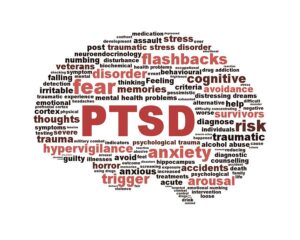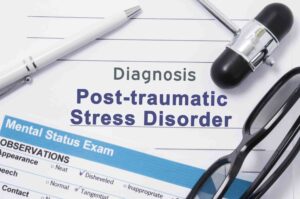If you know a person with PTSD. That refers to post-traumatic stress disorder (PTSD). Then you may be wondering how you can help. It can be difficult to see someone you care about struggling, and you may not know what to do to make things better. Thankfully, there are many tips and strategies that can help both you and the person with PTSD. In this blog post, we will discuss some of the best ways to provide support and assistance.
Contents
What Is PTSD?
 PTSD is a situation where someone has experienced or witnessed a traumatic event. And as a result, they have long-lasting effects on their mental health. People with PTSD relive their trauma through nightmares and flashbacks. They may also feel hopeless, detached, or even suicidal. It is important to remember that everyone experiences PTSD differently.
PTSD is a situation where someone has experienced or witnessed a traumatic event. And as a result, they have long-lasting effects on their mental health. People with PTSD relive their trauma through nightmares and flashbacks. They may also feel hopeless, detached, or even suicidal. It is important to remember that everyone experiences PTSD differently.
Also, understand the fact. That they may not want to talk about their trauma. Pushing them to do so will only make things worse. So, be patient and let them come to you when they’re ready.
Furthermore, try to be a good listener. Show them that you care and want to help. Avoid giving advice or telling them what they should do. Instead, let them know that you’re here for them and will support them through this tough time.
Lastly, provide practical assistance. Offer to help with day-to-day tasks or errands. This can take some of the burdens off of their shoulders. You can also look into local resources or therapy options that can help them in their recovery journey.
How To Recognize Person With PTSD?
Recognizing someone with PTSD is the primary thing. Many people with the disorder don’t look like they’re suffering. They may seem angry, irritable, or withdrawn.
There are some key symptoms. That can help you identify someone who might be living with PTSD:
- Recurrent and intrusive memories of the traumatic event.
- Dreams or nightmares related to the trauma.
- Severe emotional reactions (e.g., intense fear, horror, anger, guilt) to reminders of the trauma.
- Attempts to avoid thoughts, feelings. Or conversations associated with the trauma.
- Efforts to avoid activities, places. Or people that remind them of the trauma.
- Memory problems (e.g., trouble remembering important aspects of the event).
- Feeling “spaced out” or detached from one’s surroundings.
- Reduced interest in activities that were once enjoyed.
- Feelings of numbness or disconnection from others.
- Irritability, aggression, or angry outbursts.
- Self-destructive behaviors (e.g., alcohol or drug abuse, recklessness).
- Extreme vigilance for danger or threat.
- Constant feeling of being “on edge.”
These are only a few examples. But if you notice any sudden changes in behavior or mood. It’s important to reach out and ask if everything is okay. Many people with PTSD feel ashamed. And don’t want to burden anyone. So they try to cope on their own.
However, recognizing symptoms of PTSD is not easy. Because, it could be misinterpreted with other mental illness. That somehow shows the similar signs. Such as, schizophrenia, anxiety, depression, etc.
How To Help Someone With PTSD?

Helping someone with PTSD is important. But, it is not as easy as it sounds. It is important to be patient, understanding, and supportive.
Here are some strategies to help someone with PTSD:
Strategies
Educate yourself about the condition
This is the first strategy in order to help someone with PTSD. It is important that you learn about what they are going through. This will help you to understand their experience. And provide support in a way that is meaningful for them. Because, each individual experiences PTSD differently, it is important to understand their unique needs.
Be patient and understanding
This is probably the most important strategy. It is important to be patient with them as they heal. And, try to be understanding of their experience. This can be a difficult time for them. And your patience and understanding will go a long way. Without this, you might not help someone with PTSD.
Provide support
There are many ways you can provide support for someone with PTSD. You can offer emotional support, practical support. Or even financial support if needed. But, it is important that you do not try to fix their problems. Just being there for them is often the best thing you can do.
Be there for them
 It can be really helpful for someone with PTSD to know that they have someone. And, that someone really wants to help by being there only. Just being present and listening can be incredibly helpful. Don’t try to fix things or tell them what to do. Just let them talk and offer your support.
It can be really helpful for someone with PTSD to know that they have someone. And, that someone really wants to help by being there only. Just being present and listening can be incredibly helpful. Don’t try to fix things or tell them what to do. Just let them talk and offer your support.
Avoid triggers
If you know of any things that trigger the person’s PTSD symptoms. Try to avoid those things if possible. This may not always be possible. But it’s something worth trying if it can make life easier. in this way, you can help someone with PTSD.
Encourage treatment
It is important to encourage the person with PTSD to seek treatment. This can be a difficult step for them. But, it can be incredibly helpful in managing their symptoms. Because without treatment things might get worse. And, it can be difficult for someone with PTSD to manage on their own.
Tips To Follow While Helping Someone With PTSD
There are things which you need to take care of. When you are willing to help someone with PTSD. You must remember a few things. Such as:
- You may always expect them to recover very soon. But recovery takes time. So, you need to be patient and not push them hard.
- Try not to be judgmental about their condition. And give them space when they need it.
- Moreover, make sure that you do not force them to talk about their experiences. If they are not ready yet.
- Only let them know that you are there for them whenever they need you. Do not always be in their face.
- Take care of yourself first and foremost. As it can be quite taxing to take care of someone with PTSD. Make sure you have enough time for yourself as well.
- If you feel like you can’t handle it. Then please, do not hesitate to seek professional help.
- There is no one right way to do things. So, just go with the flow and do what feels right at the moment.
In short, try your best to be a good listener. Show empathy towards the person with PTSD. These things will surely help the person in coping with the condition better.
PTSD can be a very challenging condition to deal with. Both for the person who is struggling with it. And for their loved ones. It is important to remember that everyone recovers at their own pace. So don’t push the person you are helping too hard. Hopefully, these tips will help you to understand PTSD. And, you can help someone with PTSD carefully.
How To Diagnose PTSD?

Diagnosing the condition may be difficult as there is no one-size-fits-all approach. It can take time to make a diagnosis. As the symptoms of PTSD vary from person to person. There are ways to diagnose PTSD. Such as:
Clinical Way
A mental health professional will ask about your symptoms and personal history. They’ll also do a physical exam to check for any other problems.
Self-test
There are self-tests available online that can help you determine if you have PTSD.
Questionnaire Test
There is also an option of going through with some question. Such questions are:
- How severe was the event?
- What kind of support did you have after the event?
- Did you ever experience any other traumatic events?
- Do you have flashbacks or intrusive thoughts about the event?
- Are you avoiding anything because of what happened?
- Do you feel numb or detached from others?
- Are your sleep habits disrupted since the event occurred?
- When did the traumatic event occur?
There is not always a clear answer when it comes to diagnosing PTSD. It can be a difficult process. Especially if the person is not aware that they are suffering from the condition. If you feel like you may have PTSD, there are self-tests available online that you can take to help determine your symptoms.
Treatment For People With PTSD
 When you diagnose someone with PTSD. It is important to get them the best possible treatment. There are many different types of treatments available. And the one that will be best for a particular person will depend on their individual symptoms. Some common treatments include:
When you diagnose someone with PTSD. It is important to get them the best possible treatment. There are many different types of treatments available. And the one that will be best for a particular person will depend on their individual symptoms. Some common treatments include:
- Psychotherapy: This type of therapy involves talking about the traumatic event with a therapist. This can help people process the event and deal with any associated emotions.
- Cognitive-behavioral therapy: This type of therapy helps people change their thoughts and behaviors related to the traumatic event. It can help reduce symptoms like avoidance and hyper-arousal.
- Pharmacotherapy: medication may be prescribed to help treat PTSD symptoms. Common medications include antidepressants and anti-anxiety medications.
It is important to work with a doctor to find the best treatment for someone with PTSD. There are many different treatments available, and the one that is best for a particular person will depend on their individual symptoms.
Furthermore, treatment for PTSD is often long-term. It is important to stick with the treatment plan and continue to receive treatment even after symptoms have improved. As it is a long process to get recovery.
Conclusion
To conclude, helping someone with PTSD is a difficult task. However, it is important to be patient, understanding. And available to help in any way possible. If you think someone you know may be suffering from PTSD. Don’t hesitate to reach out and offer your support.
It would be great for people to get the support from their loved ones. Because the help and support from family can do magic. Then, other medications could. However, it is not difficult to help them as they are suffering with too. So, help till you can. Otherwise ask for professional help in order to get the right directions for PTSD treatment,
If you feel unable to help more. Reach out to a therapist or other mental health professional. They will guide you in the right way and get the help you need. There are also many helpful online resources available. Remember, you are not alone in this battle. With treatment and support, you can help someone with PTSD. And, live your life happily with them.
A Word From Therapy Mantra
Your mental health — Your psychological, emotional, and social well-being — has an impact on every aspect of your life. Positive mental health essentially allows you to effectively deal with life’s everyday challenges.
At TherapyMantra, we have a team of therapists who provide affordable online therapy to assist you with issues such as depression, anxiety, stress, workplace Issues, addiction, relationship, OCD, LGBTQ, and PTSD. You can book a free therapy or download our free Android or iOS app.


